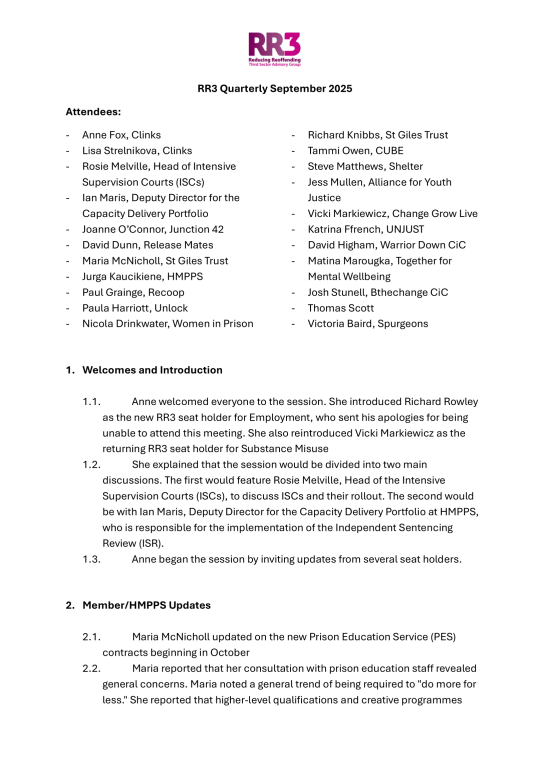Last week the Ministry of Justice announced the continuation of the Justice Data Lab pilot and published the learning from the first year of the pilot. The report includes the key findings from submissions to date, reflection on the data lab processes, information on the Ministry of Justice's engagement with users throughout the pilot and details of the future of the Data Lab. Over the year of the pilot I have written blogs on the potential of the Justice Data lab and in January on the findings so far. This blog is a quick update summarising some of the key information in the MoJ’s report on the pilot.
An update on the results
The Ministry of Justice’s report summarises the results of the Data Lab by the type of intervention and shows that interventions aimed at getting individuals into employment; programmes to improve learning while in prison; and provision of accommodation to offenders on community sentences and after release from custody had a statistically significant decrease on the one year reoffending measure. In addition while the report says that there were no statistically significant results on the one year reoffending measure for arts interventions, one of the interventions included as a programme aimed to improve learning is the provision of arts and hobby materials grants by Clinks’ member Prisoners Education Trust. In addition to this a number of programmes showed a statistically significant decrease on the frequency of reoffending. These included interventions aimed at getting offenders into employment and the Family Man programme run by Clinks’ member Safe Ground who use drama interventions in prisons.
Interventions aimed at addressing accommodation needs have shown mixed results with some showing a reduction in reoffending and others an increase. The MoJ explain this as reflecting variations in the level of needs of service users and in the intensity of interventions. This highlights some of the complexities and challenges of the Data Lab results and the fact that they should be used in comjunction with other evaluation methods so that the impact of services can be fully understood. And of course, all of the results only reflect the impact on reoffending of specific programmes and should not be taken as definitive evidence of the effectiveness of any of the kinds of interventions used by organisations and projects using the Data Lab.
The future of the Justice Data Lab
The Data Lab pilot has been extended for another year and will continue to be free and operate on the same service model. The MoJ has outlined a number of improvements they wish to make. These include providing additional reoffending metrics including the severity of reoffending and the rate of re-incarceration. They plan to incorporate Offender Assessment (OASys) data into the service in order to better take into account the criminogenic needs (needs that relate to intermediate outcomes that are linked to desistance) of service users in analyses. In addition they will also, where possible, begin providing reoffending outcomes by demographic profiles such as gender and this could be very helpful in understanding the impact of services for different groups of offenders and for providing evidence on specialist or tailored services.
Finally, the matched control groups currently consist of individuals from across England and Wales, MoJ plan in the future to account for regional data when matching service users with a control group. This may be an indication of the future role of the Data Lab beyond the pilot period, when the Transforming Rehabilitation reforms have been implemented, however this remains unclear.
Using the Justice Data Lab
As you may have read, in my previous blog I try to provide some answers to the question ‘Is the Justice Data Lab for you?’ If you’re interested in finding out more about using the Justice Data Lab, you can also read our guidance and FAQs here. I also highly recommend reading the MoJ’s report on the pilot year which also answers some of these questions and provides more detail on how the MoJ is trying to improve their processes and what data they need to process requests.
What's new
Blogs
Violence Against Women and Girls (VAWG) Strategy Blog
Publications
Latest on X
The role is for a leader from an organisation focused on racially minoritised people, with expertise in service delivery, policy, advocacy, or related areas in criminal justice. Racial disparities are present at every CJS stage. This role ensures these voices are central in shaping policy to help address and eradicate them. Apply by Mon 18 Nov, 10am. More info: https://www.clinks.org/voluntary-community-sector/vacancies/15566 #CriminalJustice #RR3 #RacialEquity

